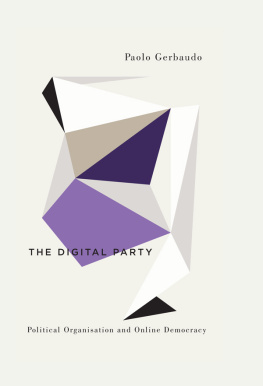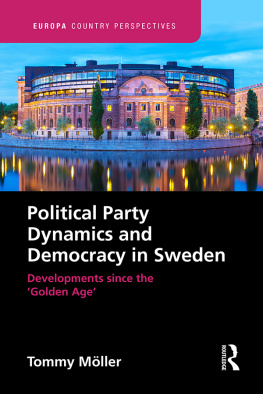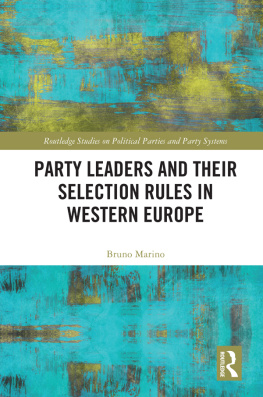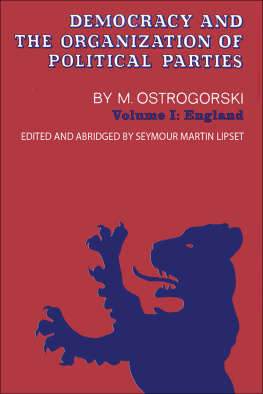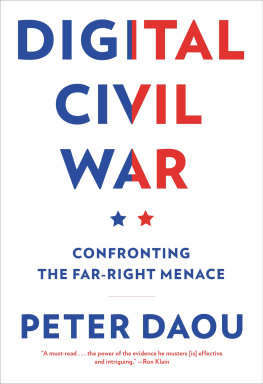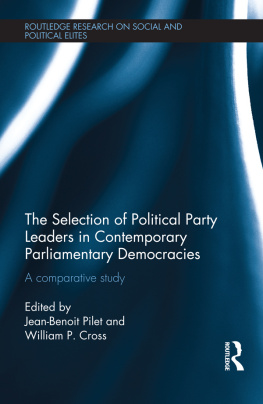Contents
Guide
The Digital Party
Digital Barricades:
Interventions in Digital Culture and Politics
Series editors:
Professor Jodi Dean, Hobart and William Smith Colleges
Dr Joss Hands, Newcastle University
Professor Tim Jordan, University of Sussex
Also available:
Shooting a Revolution:
Visual Media and Warfare in Syria
Donatella Della Ratta
Cyber-Proletariat:
Global Labour in the Digital Vortex
Nick Dyer-Witheford
The Digital Party:
Political Organisation and Online Democracy
Paolo Gerbaudo
Gadget Consciousness:
Collective Thought, Will and Action in the Age of Social Media
Joss Hands
Information Politics:
Liberation and Exploitation in the Digital Society
Tim Jordan
Unreal Objects:
Digital Materialities, Technoscientific Projects and Political Realities
Kate ORiordan
The Digital Party
Political Organisation and
Online Democracy
Paolo Gerbaudo

First published 2019 by Pluto Press
345 Archway Road, London N6 5AA
www.plutobooks.com
Copyright Paolo Gerbaudo 2019
The right of Paolo Gerbaudo to be identified as the author of this work has been asserted by him in accordance with the Copyright, Designs and Patents Act 1988.
British Library Cataloguing in Publication Data
A catalogue record for this book is available from the British Library.
ISBN 978 0 7453 3580 3 Hardback
ISBN 978 0 7453 3579 7 Paperback
ISBN 978 1 7868 0360 3 PDF eBook
ISBN 978 1 7868 0362 7 Kindle eBook
ISBN 978 1 7868 0361 0 EPUB eBook
This book is printed on paper suitable for recycling and made from fully managed and sustained forest sources. Logging, pulping and manufacturing processes are expected to conform to the environmental standards of the country of origin.
Typeset by Westchester Publishing Services
Simultaneously printed in the United Kingdom and United States of America
Contents
Series Preface
Crisis and conflict open up opportunities for liberation. In the early twenty-first century, these moments are marked by struggles enacted over and across the boundaries of the virtual, the digital, the actual and the real. Digital cultures and politics connect people even as they simultaneously place them under surveillance and allow their lives to be mined for advertising. This series aims to intervene in such cultural and political conjunctures. It features critical explorations of the new terrains and practices of resistance, producing critical and informed explorations of the possibilities for revolt and liberation.
Emerging research on digital cultures and politics investigates the effects of the widespread digitisation of increasing numbers of cultural objects, the new channels of communication swirling around us and the changing means of producing, remixing and distributing digital objects. This research tends to oscillate between agendas of hope that make remarkable claims for increased participation, and agendas of fear that assume expanded repression and commodification. To avoid the opposites of hope and fear, the books in this series aggregate around the idea of the barricade. As sources of enclosure as well as defences for liberated space, barricades are erected where struggles are fierce and the stakes are high. They are necessarily partisan divides, different politicisations and deployments of a common surface. In this sense, new media objects, their networked circuits and settings, as well as their material, informational, and biological carriers all act as digital barricades.
Jodi Dean, Joss Hands and Tim Jordan
Acknowledgements
This book would not have been possible without the sympathetic support of many colleagues and friends who have contributed in different ways to its development. I would like to thank David Castle, my editor at Pluto, and the Digital Barricades series editors for their advice and support. Events and debates conducted through the Centre for Digital Culture at Kings College London, and in particular the cyberparty conference in May 2015, were also useful in developing my thinking. I am grateful to the 30 interviewees who contributed their experience and ideas, and to all the people who volunteered to read an early draft of the book, providing useful comments: Maria Haberer, Graham Jones, Manfredi Mangano Francesco Screti, Lazaros Karavasilis, Antonio Calleja Lopez, Che Brandes-Tuka, Jasper Moriarty, Giorgios Venizelos, Felicia Panosoglu, Mawii Zothan, Asmita Jain, Patrick McCurdy, Vicente Rubio, Lorenzo Coretti, Julia Schnheit, Robin Piazzo, Francesco Screti, Enrico Padoan and Gavin Brown. My thanks also go to Alex Foti, who provided very insightful comments and advice on style for this book; to Javier Medina Lopez for discussions about the relationship between movement and parties in Spain; to Nick Srnicek and Mark Cot for valuable discussion about digital capitalism and the logic of Big Data.
Introduction
On 18 May 2018, the registered members of the Movimento 5 Stelle (Five Star Movement) were convoked via email to participate in an important online consultation due to take place from 10 a.m. to 8 p.m. A window was created on the main dashboard of the Rousseau participatory portal to vote on the government contract, the agreement that had long been negotiated with Lega, the right-wing populist party of Matteo Salvini. There were 44,796 people who participated in the consultation, with 42,274 voting yes and 2,522 voting no: an overwhelming 94 per cent majority in favour of the agreement. Luigi Di Maio celebrated the vote on Il Blog delle Stelle, the official party house organ, as a democratic consecration of the Contract for the Government of Change and the pact with Salvini. A few weeks later, eventually the Five Star Movement and Lega formed a coalition government which was dubbed by the press yellow-green, or carioca, because of the colours of the two parties (yellow for Five Star and green for Lega).
How was it possible for an internet party that had long been ridiculed by the mainstream media in Italy for its nave techno-utopianism and dilettantism to enter government less than 10 years after its foundation? What led it to enjoy such a widespread popularity in the Italian electorate? What kind of political organisation and model of democracy does this formation put forward? And is the case of the Five Star Movement an Italian exception or also an indication of what is happening in other countries?
To broach these questions, it is useful to do a flashback to September 2017, eight months before these events, watching a YouTube video showing Luigi Di Maio, the Five Star Movement leader and current Vice Prime Minister, before the crowds of Italia a 5 Stelle (Five Star Italy), the annual national gathering of the Five Star Movement. Just like prior editions, the event takes place in Rimini, a beach resort on the Northern Adriatic coast, which has a tradition of hosting political conventions at the summers end, when hotels start emptying out as vacationers return to Bologna, Milano or Munich. Di Maio is chatting with his bodyguards as he approaches the entrance of the meeting area.
of the Five Star Movement, Di Maio is a 31-year-old from Avellino, near Naples. His father was a local councillor of Movimento Sociale Italiano (MSI), the old party of hard right. His dark complexion, puppy eyes and perennial smile make him popular with female voters. He is widely considered by the press as not qualified for a leading political role as he did not complete his degree in law, and his CV, prior to becoming a politician, listed only some short stints as Web master and stadium steward for the Naples football team. However, he is hardly a political novice. Like many other leaders of the Five Star Movement, Di Maio has been active for many years in the political movement launched by comedian Beppe Grillo, what amounts to a great badge of honour amongst movement supporters and has had the important role of vice-president of the Chamber of Deputies.

